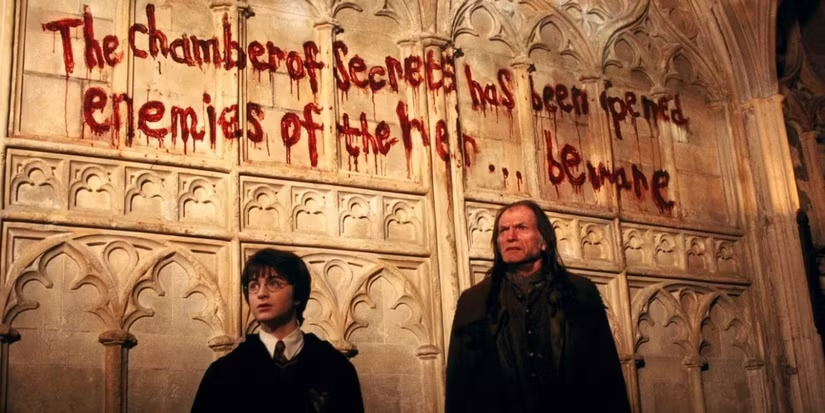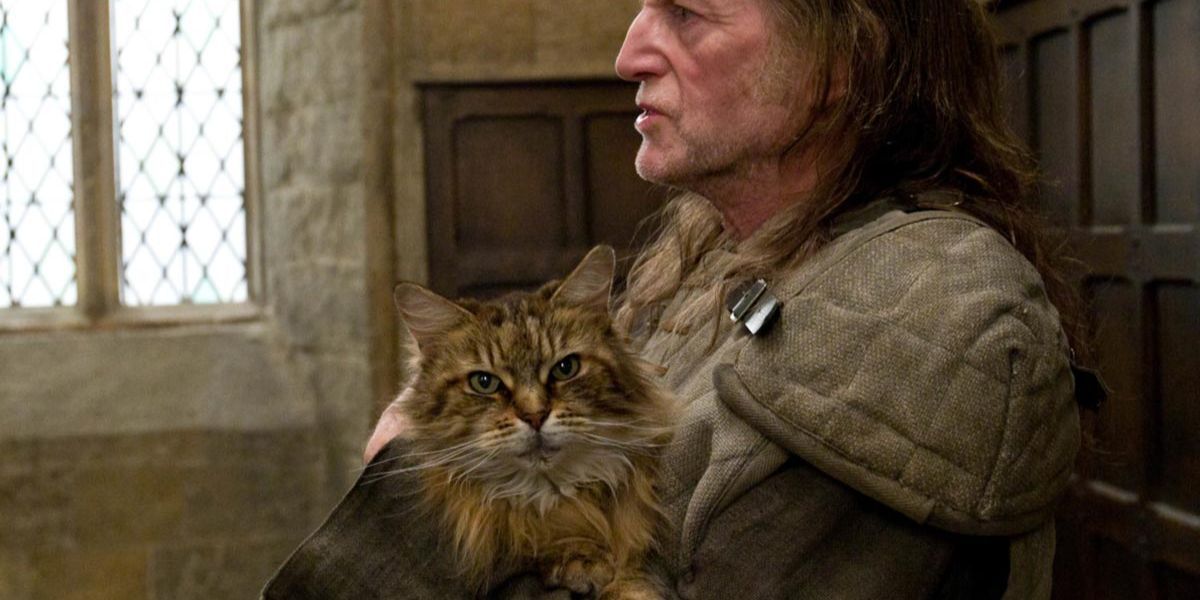
When a franchise like Harry Potter spans eight films and includes more than 770 characters, some numbers are bound to remain mysterious. One of these characters was Argus Filch, who fans wrote off as mere comic relief. More likely a bitter Squib condemned to cleaning floors that magic could clean in seconds. But behind his constant muttering and the glow of his oil lamp lies one of the wizarding world’s strangest and most disturbing theories: that Filch is not human at all.
According to a long-circulating fan theory, Argus Filch may actually be a supernatural manifestation of Hogwarts itself, as a living embodiment of the castle’s personality, just as Peeves is its spirit of mischief. The more you think about it, the more it makes sense: his strange timing, his instinct for trouble, his devotion to order and punishment. The theory suggests that he’s not just part of Hogwarts, he is Hogwarts, or at least an aspect of his personality.
Argus Filch could be Hogwarts’ dark secret
As fans of the Wizarding World of Harry Potter, Many know that Filch is a Squib, a non-magical person born to magical parents, and this is perhaps the greatest tragedy of his life. The main proof is the fact that in Harry Potter and the Chamber of Secrets, when Harry comes across his letter Kwikspell, a correspondence course for beginners in magic, painting a portrait of a man desperate to join a world he can only observe, a man defined by his inability to succeed.
Filch’s employment is often rationalized as an act of mercy by Dumbledore, giving the poor man a place where he can belong. This explanation, however, is a sentimental story that completely collapses under logical scrutiny. First, and most obvious, his work is fundamentally redundant. For guard work, Hogwarts employs a large team of house elves who are capable and happy to carry out their duties. They can magically clear the entire fortress in the blink of an eye.
Even Mrs. Weasley uses household charms to clean the entirety of Grimmauld Place, proving that magic for such tasks is relatively standard. Filch, with his mop, bucket, and “well-oiled chains,” is not only ineffective; it’s pre-magical nonsense, an illogical choice for a school that is the pinnacle of magic in the UK. Second, for disciplinary reasons, the school is already patrolled by teachers, prefects, and head boys, all of whom possess magic and are much better equipped to deal with magically gifted troublemakers.
Logically, the castle has no practical need for Argus Filch. Therefore, the “pity” explanation seems thin. Dumbledore is nice, but fans know that the Headmaster is also a cunning man. What really undermines “Squib’s” narrative are its almost supernatural abilities. A man without magic should be the least effective guard in the school, yet he is the most omnipresent. How does Filch know the castle’s secret passages better than anyone else? It’s not just a casual skill; it is an in-depth knowledge of a building that actively changes its own layout. How can he appear as suddenly as a ghost, the very second a rule is broken?
Most of the time, when Harry and his friends are sneaky or another student tries to hide in the forbidden areas, there’s a good chance they’ll find Filch there, or he’ll become a concern, like “What if Filch finds out?” It doesn’t just find students out of bed; he seems to know what they have done, appearing with furious knowledge of a specific offense. Even its name, Argus, is a direct reference to the 100-eyed giant from Greek mythology.
In Harry Potter, Peeves and Filch have a unique connection
Peeves the Poltergeist is one of the characters from the book who failed to find his way into the films, but he is one of the more interesting characters from the original books. This is where the theory provides a surprisingly logical solution. The key to understanding Filch is that he is related to Peeves. In the story, JK Rowling makes it clear that Peeves is not a ghost, but rather the imprint of a departed soul and something completely different. Peeves is a poltergeist, a physical entity literally generated by the chaotic energy of a place filled with teenage witches and wizards.
In short, Peeves is the walking manifestation of centuries of student misdeeds. He is the reckless driver of chaos at Hogwarts. Therefore, if the castle can spontaneously give birth to an entity of pure chaos, it is logical to assume that it would also create an opposing force. For every rule broken, for every muddy hallway, there was also a desperate need for order, for discipline, for someone to clean up the mess. This is where the theory comes in, suggesting that this need for control manifests itself through one’s own physical agency. Argus Filch is that agent, trying to keep the chaos under control.
While Peeves represents the destructive and chaotic side of the castle, Filch embodies the one in control. The never-ending feud between the annoying characters of Filch and Peeves is no longer a personal feud. It’s a cosmic struggle between two opposing forces that both came with the castle. This one idea transforms Hogwarts from a magical building into genius of the place (the spirit of a place) that has become so strong that it can manifest its own guardians. Filch and Peeves are his yin and yang, and all of Filch’s impossible traits fall into place. The theory opens doors with multiple possibilities, and everything fans have seen and read begins to present itself in a different light.
Perhaps Filch’s unnatural consciousness is not intuition; it is the castle that tells him where to go. His strange, “almost psychic” bond with Mrs. Norris is no longer that of a man and his pet; it’s a hive mind. Maybe she’s not his cat; it is an extension of its own function. Look at how the text describes their connection: she finds trouble and he arrives seconds later. She is part of the castle’s sensory network, like the portraits, and Filch is the executioner.
Filch’s True Goal Makes Him Harry Potter’s Saddest Character
Filch’s theory fits well with everything fans know about magic in the world. Harry Potter universe. The magic in Rowling’s world is deeply emotional, driven by intention, shaped by memory, and alive in ways that are difficult to explain. The most prominent example is Harry himself, a part of the magic living within him, powered by magic cast by his mother in order to save him from the unforgivable killing curse. A wand chooses its wizard. Love can create a shield more powerful than any spell. It is entirely plausible that a place as ancient and saturated with emotion as Hogwarts could acquire some form of sentience. The castle actively demonstrates its own will with locations such as the Room of Requirement.
Stairs like to change, which implies a preference. And, more interestingly, the castle itself physically rejects Dolores Umbridge by denying her access to the Headmaster’s office. If Hogwarts can feel, it has a soul, and that soul also has a dark side. This theory traces Filch’s scariest moment: when he cries with happiness in Harry Potter and the Order of the Phoenix after Umbridge gave him permission to whip the students. If Filch is just a man, he is a deeply disturbed sadist. But if it is a function of the castle, it is not sadism. It is the pure joy of an entity finally allowed to fulfill its primary purpose. Filch doesn’t care who is in charge, only that their rules are followed.
This explains his discordant behavior Harry Potter and the Deathly Hallows when Snape and the Carrows take over. A human staff member who loved Dumbledore would rebel or quit. To steal? He just keeps working. For what? Because the Carrows, brutal as they were, represented the new Order. Because of the castle, Filch cannot rebel against the established Headmaster, be it Dumbledore, Umbridge, or Snape. It is programmed to serve the seat of power, not the person who sits there. This biological link is reinforced by the attack of Chamber of Secrets. When the basilisk, a creature old enough to rival the castle’s magic, attacks, it does not kill Filch. However, Filch should have been one of the victims, given his active surveillance in the various darker and darker areas of the castle. But this petrifies Mrs. Norris. He did not attack the man; it attacked his “eyes”.
Whether this theory is the author’s original intention or simply a fan deduction, it closes all the logical holes and transforms Filch from a two-dimensional figure into a that of Harry Potter the most tragic characters. He becomes like a ghost, neither quite alive nor quite dead, content to eternally clean up the mess left by centuries of misdeeds. This is illustrated most beautifully and tragically in the final moments of Harry Potter and the Deathly Hallows Part 2. After the battle, among the rubble and the dead, we see Filch. He survived the war that killed powerful wizards, and what does he do? He sweeps. He tries to sweep an entire destroyed castle with a single broom. Can he fix it alone? No, but he does it anyway, because that’s who he is. The castle is destroyed and his trusty immune system, in the form of an entity, is already trying to heal him.

- Created by
-
Rowling
- First film
-
Harry Potter and the Sorcerer’s Stone
- Latest movie
-
Harry Potter and the Deathly Hallows Part 2
- Upcoming TV Shows
-
Harry Potter
- Cast
-
Daniel Radcliffe, Rupert Grint, Emma Watson, Maggie Smith, Alan Rickman, Helena Bonham Carter, Ralph Fiennes, Michael Gambon
- Where to watch
-
HBO Max
The Harry Potter franchise follows the adventure of a young boy who introduces a whole new world of magic, chaos, and darkness. Crossing the obstacles in his path, young Harry’s heroic rise pits him against Lord Voldemort, one of the most dangerous wizards in the world, and all his servants.


